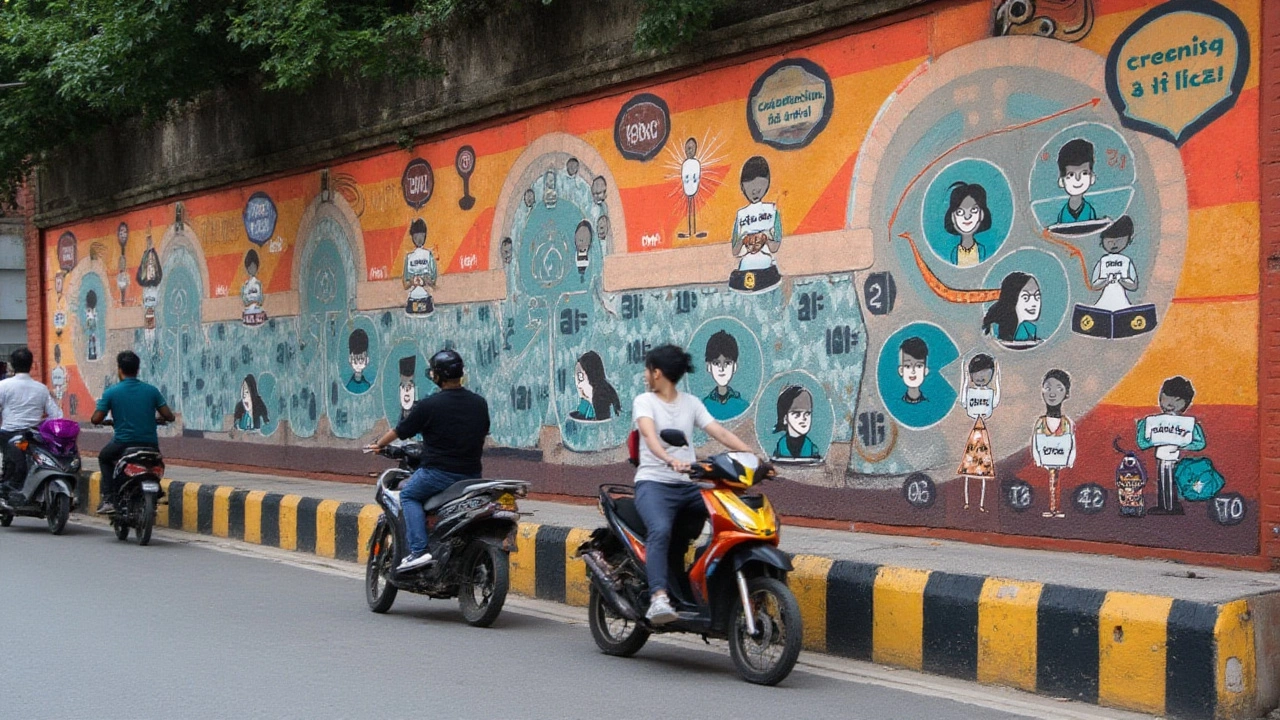The JEE Advanced is a hallmark of India's engineering entrance exams, setting a high standard for aspiring students each year. Unlike other exams, each paper is unique, crafted by different IITs on a rotational basis. Due to this system, each exam reflects the distinct academic and pedagogical approach of the institute creating it.
While many students argue over which IIT has produced the most challenging paper, an equally riveting discussion revolves around which institute set the easiest examination. Traversing through student voices and historical performance data, we delve into the years where candidates found the paper to be manageable without compromising on the evaluative depth.
This breakdown serves not just as a recounting of past exams but as a guide for future examinees to strategize their preparation efficiently. Presenting a blend of analysis, tips, and shared experiences, this article aims to illuminate the diverse facets of JEE Advanced papers over the years.
- Understanding JEE Advanced
- Role of IITs in Paper Setting
- Historical Analysis of Easy Papers
- Student Experiences and Feedback
- Strategies for Tackling Tough Papers
- Preparing for JEE Advanced
Understanding JEE Advanced
The Joint Entrance Examination (JEE) Advanced is a gateway to the prestigious Indian Institutes of Technology (IITs) and a few other top engineering colleges. It stands as a litmus test scrutinizing not just rote learning, but the profound understanding of concepts in physics, chemistry, and mathematics. Annually, lakhs of students vie for the limited seats available across the IITs, making JEE Advanced one of the toughest undergraduate examinations in the world.
JEE Advanced distinguishes itself from the comparatively straightforward JEE Main by its unconventional problem-solving approach. The questions demand deep theoretical knowledge paired with analytical thinking and application skills. The exam comprises two papers, each spanning three hours. While the exact format may vary each year, it typically includes a mix of multiple-choice questions, numerical value questions, and matching type questions. The pattern's variability adds an enigmatic charm to the exam, ensuring that even the seasoned aspirants have their moments of surprise.
"JEE Advanced is not just an exam; it's a race against time reflecting the prowess of India's brightest scientific minds." - Prof. J.N. Reddy, IIT Hyderabad
The role of different IITs in setting the papers introduces an element of unpredictability. Each institute, when overseeing the exam, tends to imprint its academic philosophy onto the paper. This means the perception of what constitutes an 'easy' or 'tough' paper can hinge heavily on the specific IIT's approach to education and pedagogy. Historical data often points towards the IITs like IIT Roorkee and IIT Kharagpur as having authored papers perceived as relatively manageable by candidates.
Exam Preparations and Strategies
Aspiring candidates often start their preparation journey as early as in their high school years. Ingraining a disciplined study routine is essential, as is nurturing a passion for learning over memorization. A typical preparation plan includes extensive practice of previous years' papers, enrollment in reputable coaching institutions, and dedicating focused months to self-study. In our digital age, numerous online platforms provide video tutorials, mock tests, and forums for discussion, offering valuable resources to aspirants.
A data point worth noting is that recent statistics have demonstrated a growing trend of students balancing both JEE Main and JEE Advanced effectively by integrating syllabus coverage, enabling topic overlap to work advantageously. Table summaries from preceding years highlight a standardized shift towards including increasingly complex integrative questions, speaking to evolving education trends.
In summary, cracking JEE Advanced is about understanding the examination's ethos, strategizing, and learning over competing. Each paper might turn into a personal saga for every aspirant, with bits of anticipation, sweat, and eventual triumph. Embracing this challenging journey, while keeping the end goal of entering the halls of IIT in sight, is the true essence of preparing for JEE Advanced.
Role of IITs in Paper Setting
The Indian Institutes of Technology, affectionately known as IITs, each carry a unique legacy of excellence in engineering education. These prestigious institutions are pivotal in the sustainability of the JEE Advanced examination format. Charged with overseeing the creation of the exam, IITs are known for their distinctive approach based on the academic ethos of the particular institute. Every year, a different IIT gets the mantle of designing the paper, ensuring that the standards remain uncompromised yet varied. This rotational system is both a revered tradition and a celebration of the diverse academic cultures within these institutions. By meticulous planning and designing problems that assess a gamut of skills from critical thinking to analytical reasoning, they maintain both a test's integrity and its unpredictability.
The process of setting up a JEE Advanced paper is exhaustive and collaborative. Typically, a set of senior faculty are chosen to spearhead the task, often consulting with other academics to pool a wide range of ideas and expertise. The teams are chosen based on their specialization areas, which enables them to craft sections of the exam with unparalleled depth. The question paper aims to go beyond rote learning, pressing students to apply concepts innovatively. In doing so, it mirrors the challenges one might face in the world of scientific research and problem-solving.
One of the consistent objectives has been to avoid predictability and keep the aspirants on their toes. Imagine a scenario where the questions set by IIT Delhi one year unexpectedly focus more on dynamic physics concepts rather than traditional static ones. Here, students need to adjust their strategies swiftly. The variety in paper design approaches ensures no particular pattern develops favoring any segment of potential examinees. Ranjan Banerjee, an academician from IIT Bombay, once remarked,
“The role of setting a paper bridges the gap between textbook knowledge and real-world application, a crucial intention at the heart of science and engineering.”This quote encapsulates the fundamental philosophy that resonates with IIT’s fortitudes.
In essence, the dedicated role of IITs in paper-setting aims to balance rigor with fairness. Yet they uphold an unconscious respect for history, knowing fully well that their legacy's weight informs today's educational ethos. Students, aware of this tradition, prepare not just for an exam but for an experience symbolizing the institutes' glory and challenging academic fabric. Alumni often recall years later which particular IIT set their examination and its consequent impact on their approach to studying these subjects.

Historical Analysis of Easy Papers
The journey to understand which Indian Institute of Technology (IIT) crafted the most manageable JEE Advanced paper involves delving deep into the annals of exam history. Students often whisper about certain years where the exams, rather than being a Herculean task, reflected a more gentle challenge. Notably, such perceptions aren't just whimsical notions. They stem from a combination of statistical analysis, feedback from examinees, and the pass percentage trends observed over years. The idea is not merely that these papers were straight-up easy but were more aligned with the expected preparation levels of candidates.
For instance, the paper set by IIT Delhi in the year 2015 is often remembered fondly by test-takers for its straightforward approach. This wasn't due to a lack of depth in questions, but rather their clarity and structure. That year saw a slight increase in the number of high scorers, hinting at an examination that tested understanding without necessitating complex leaps in logic. Here's an interesting perspective provided by an academician:
"The art of setting an effective but accessible paper lies in challenging the student's concepts rather than their ability to handle overly convoluted problems."
Another noteworthy year was IIT Bombay's contribution to the JEE Advanced papers back in 2010. This year, both chemistry and mathematics sections seemed to resonate with students, allowing them to display their conceptual clarity more effectively. The key to IIT Bombay's approach was the balance between theoretical questions and real-world applications, a method noted by many educational experts. Some even pointed out that such an approach, rather than offering students an 'easy' exam, provided a clearer path to showcase their strengths.
While delving into historical data, one can spot years where IIT Madras and IIT Kharagpur also set papers that were considered less daunting. A curious pattern here is in the way these institutes design the exam structure. A combination of precise questioning aimed at core concepts and intelligent distribution across sections can sometimes lead to a perception of ease among candidates. This historical analysis proves invaluable for aspirants, nudging them toward refining their preparation strategies rather than chasing after the illusion of an 'easy' paper.
The analysis doesn't end at perceptions alone. Let's take a quick look at relevant statistics:
| Year | IIT | Pass Percentage |
|---|---|---|
| 2010 | IIT Bombay | 8.2% |
| 2015 | IIT Delhi | 9.1% |
This numerical evidence further fuels discussions among both educators and students. By understanding these trends, aspiring candidates can position their preparation to better tackle potential surprises in future exams. It underscores the importance of focusing on strong foundational knowledge rather than banking on possible ease in complexity. With insights from history, aspirants now have the power to adapt their strategies, whether facing IIT's toughest exam or the most manageable one.
Student Experiences and Feedback
Diving into the vast pool of student experiences regarding the JEE Advanced papers, one can find a spectrum of opinions and narratives that paint a fascinating picture of this prestigious exam. Each year, thousands of aspiring engineers sit for the JEE Advanced, eager to crack this challenging gateway to the IITs. Despite the anxiety that often clouds the build-up to the exam, many students find solace in sharing their experiences, offering an invaluable resource for future batches.
Among the numerous testimonials, a recurring theme is the disparity in perceived difficulty between papers. Some years, candidates walk out of the examination hall pleasantly surprised by the ease of questions, highlighting the occasional trend where specific IITs set more accessible papers. For instance, there was notable buzz around a certain year when IIT Madras set a paper that several candidates classified as less daunting. This perception arose from the paper's straightforward questions, giving a fair chance to students who had focused on basic concepts rather than tricky problems.
Interestingly, these experiences are not only shaped by the difficulty level but also by the unexpected twists each JEE Advanced exam tends to bring. While one IIT may present an easier physics section, they might counterbalance it with a more challenging mathematics part. It's this unpredictable nature that keeps students on their toes and fosters a culture of comprehensive preparation rather than selective studying.
One could say that student feedback offers a valuable mirror reflecting the annual ebb and flow of JEE Advanced papers. Each story tells of meticulous planning, sleepless nights, and moments of enlightenment. Addressing a webinar on engineering education, a renowned educator once said, "The JEE Advanced is much like life; unpredictable yet rewarding for those who prepare diligently." This sentiment resonates with countless students who emerge from the challenging exam stronger and more determined.
Adding statistical insights to these anecdotes complements subjective experiences with tangible evidence. Data from previous years often show variations in average scores, helping to confirm or debunk student claims about paper difficulty. For example, a year perceived as easier by many saw a marked increase in average scores across all subjects, reinforcing the feedback from students.
In conclusion, the collage of student experiences and feedback forms a tapestry rich with insights, lessons, and encouragement. As new batches aim for the prestigious IITs, they can find guidance in these shared stories, ultimately crafting their paths armed with wisdom from those who navigated the journey before them.

Strategies for Tackling Tough Papers
When faced with the challenge of a particularly tough JEE Advanced paper, students need more than just their academic prowess; they must hone strategic approaches for navigating these arduous exams. One key strategy is to remain calm and composed, as anxiety can cloud judgment and affect performance negatively. It is essential to approach each question with a clear mind, ensuring that you accurately comprehend what is being asked before attempting a solution. This is especially vital in a complex exam like the JEE Advanced, where the questions are often designed to test analytical and problem-solving skills rather than rote knowledge.
Breaking down the paper into manageable segments can greatly aid in tackling tougher questions. Prioritizing questions based on perceived difficulty and familiarity allows students to accrue marks efficiently, enhancing their overall score. Candidates should first attempt questions they feel most confident about, ensuring they secure those crucial easy marks before venturing into more demanding sections. Additionally, time management becomes paramount in such scenarios. Allocating specific time slots to sections or groups of questions can help maintain a balanced pace, avoiding the common pitfall of spending too much time on challenging problems while others remain unattempted.
A well-prepared student will also benefit from practicing mock tests under exam-like conditions. This not only helps in understanding the typical structure and dynamics of the paper but also builds the stamina needed to tackle a long and tough examination with sustained effort. There's a popular saying by Sir Isaac Newton that resonates well:
"If I have seen further, it is by standing on the shoulders of giants."This quote emphasizes the importance of learning from past toppers and educators who have cracked the code to excel in these exams. Learning their strategies and applying their tips can enable aspirants to sail through even the toughest of papers.
Developing a Balanced Study Routine
A balanced study routine that covers all subjects comprehensively is crucial. While revising, pay special attention to strengthening core concepts and identifying frequent errors to avoid them during the real exam. Create a checklist using an ordered list methodology:
- Identify and focus on weak areas.
- Allocate more time to difficult subjects or topics.
- Regularly solve previous years' papers to familiarize yourself with the exam pattern.
Another significant factor in successfully navigating a tough JEE Advanced paper is the ability to work under pressure. Training oneself to remain focused amid challenging questions and the ticking clock is an art that can be mastered only through consistent practice and mental conditioning. Attend workshops or group studies where possible to learn different methods and styles which peers might use, adding diversity to your learning experience. Ultimately, a holistic preparation strategy recognizing the uniqueness of JEE Advanced exams can make a substantial difference in determining how effectively one can handle their toughest challenges.
Preparing for JEE Advanced
Embarking on the journey to crack the JEE Advanced can be both thrilling and overwhelming. With nearly every aspiring engineer in India aiming for a coveted seat in one of the prestigious IITs, the stakes are undoubtedly high. The first thing to tackle is understanding the depth of the syllabus. Covering topics extensively from Physics, Chemistry, and Mathematics, it’s crucial to create a detailed study plan. Breaking down the vast syllabus into manageable daily targets can alleviate the feeling of drowning in information.
In recent years, technology has indeed been a game-changer in exam preparation. From interactive learning apps to live online classes, technology has made high-quality education more accessible than ever before. There are numerous online platforms that provide coaching for the JEE Advanced, complete with practice tests and problem-solving sessions. It's vital, however, to choose one that resonates with your learning style. This focus on personalized learning can significantly improve your grasp of complex topics.
Importance of Mock Tests
Mock tests are your best ally in JEE Advanced preparation. They not only familiarize you with the exam pattern but also help in time management, which is a critical skill for the actual exam. Regular practice tests offer a benchmark to measure your progress and highlight areas that require more attention. Over time, these repetitive evaluations ensure that you can tackle unforeseen challenges during the actual paper confidently. An insightful piece of advice from educational expert Anand Kumar, founder of Super 30, says, "Take every mock as if it is the final exam and learn from every mistake."
Another key element is problem-solving speed. While it is important to understand concepts deeply, it is equally essential to solve problems swiftly and correctly. Practicing a variety of problems will help develop the necessary skill to switch quickly between different types of questions. It's a skill that evolves with practice and patience. Balancing speed with accuracy is what often separates toppers from other candidates.
Time Management and Health
Time management is not just limited to the exam duration; it applies to every day leading up to it. A well-structured timetable that allows time for breaks and relaxation can boost productivity. Avoid burning out by ensuring you have time for recreational activities, which can rejuvenate the brain and improve focus. Another often overlooked factor is the role of health in preparation. Adequate sleep, a balanced diet, and regular physical activity can dramatically affect concentration and mental agility.
In this preparation marathon, it's important to track your progress consistently. Creating self-assessment tests from previous year papers, available online, or compiling them from books can be incredibly beneficial. This approach helps identify which topics need reinforcing and builds confidence incrementally. In addition to personal efforts, guidance from mentors or teachers remains a cornerstone in effective preparation. They can provide clarity on complex concepts, share strategies, and offer moral support. Building a strong peer group, for sharing knowledge and staying motivated, can also create a positive and competitive environment.
The road to cracking JEE Advanced is undeniably rigorous, demanding both patience and perseverance. However, with a focused strategic approach, aided by the right tools and mindset, it is undoubtedly an achievable milestone. So embark on this journey with tenacity and remember, the right preparation is half the battle won.
